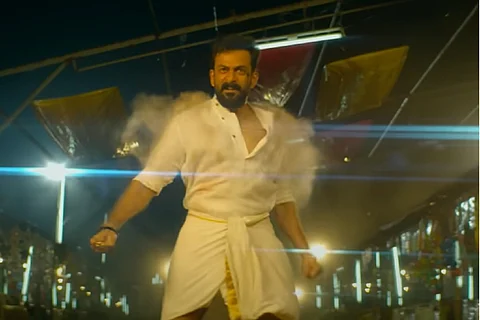

In the scenes following the introduction of actor Prithviraj’s character – Kuriachan – in Kaduva, you watch him cast a glance at the backseat of a car, and see a little boy with disability. He then asks Vivek Oberoi’s character Joseph Chandy, the father of the child, to step out of the car to have a talk. After first lauding him for his achievements, Kuriachan soon criticises Joseph for the ‘bad things’ he has done, telling him that that’s what his child was suffering for. Meaning, the disability of the child is a result of the parent’s wrong doings. Soon after the film’s release on Thursday, July 7, people with disabilities and their parents posted how hurtful the scene had been to them. By Sunday, July 10, both Prithviraj and the director of the film Shaji Kailas apologised for the thoughtless dialogue.
Shaji wrote a detailed note, admitting it was a mistake to have included that line and explaining that it was intended as a way to describe the cruelty of the antagonist, played by Vivek. They used the old saying that children suffer for the wrong actions of their parents without thinking of the context, and it was never intended to hurt those with disabilities, Shaji’s note said. He also knew how children meant the world to parents for he too could not bear it when one of his kids had a minor fall, he added, while apologising.
Prithviraj shared Shaji’s note and wrote, “Sorry. It was a mistake. We acknowledge and accept it.”
Sorry. It was a mistake. We acknowledge and accept it. pic.twitter.com/fl5zweAUIe
— Prithviraj Sukumaran (@PrithviOfficial) July 10, 2022
One of the posts about the offensive scene was from Dr Fathima Asla, a doctor with brittle bone disease. She wrote about the unavailability of a ramp at the theatre she went to watch Kaduva, which had already put her in low spirits. "And inside, as soon as the film began I hear the line that says that children with disabilities are a result of our sins. I felt sadder wondering if people still thought in these lines. I remembered someone once telling me that it is the result of the sins I did in my previous birth that I was born like this. I felt afraid thinking of my parents, wondering if they would hear such lines. A disabled-friendly, unhurting world is so far away (sic)," she wrote.
Paresh Palicha, a film reviewer with cerebral palsy, commented on Fathima’s post about how he used to hear a similar comment from elders when he asked about his condition. They would tell him, "You may have killed cows or even violently killed your own parents. Otherwise, God isn't cruel to give you this condition.”
The State Disability Commissioner SH Panchapakesan ordered a notice to be sent against Shaji Kailas and the film's producers Supriya Menon and Listin Stephen, on the basis of a complaint by Parivaar Kerala, an association of parents of children with intellectual and developmental disabilities. Pointing out that the line in the film is entirely meaningless and unscientific as well as insulting to children with disability and their parents, the complaint said that it was an offence according to Section 92 (punishment for offences of atrocities) of the Rights of Persons with Disabilities Act, 2016.
Despite the many checks on content, Malayalam cinema still has a long way to go in sensitively portraying disability on screen. Paresh recently wrote about another film, containing an insensitive portrayal of disability – Meri Awas Suno, starring Manju Warrier and Jayasurya. In the film, the male lead character (Jayasurya) loses his voice at the peak of his career as a radio jockey, and Manju Warrier's character, as a speech therapist, suggests insensitive methods of 'treatment.' Paresh wrote, "It takes us back to the primitive days when it was believed that any unsurmountable physical impairment (speech in this instance) can be overcome by physical and psychological torture."
Also read: